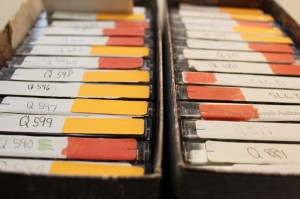Four years ago, the Department of Special Collections at San Diego State University described its program to preserve a collection of Peoples Temple records, including audiotapes and tape transcripts, photocopies of original unclassified documents from the federal government, and newspaper and magazine articles related to the Peoples Temple Christian Church and the Peoples Temple Agricultural Settlement at Jonestown, Guyana. Special Collections also announced the launching of a program to preserve the audiotapes in the collection and this has been the aspect of the work which has shown the most progress in the last year.
Audiotape is not a preservation medium, and the tape preservation program was envisioned as a digitization conversion process for archival safekeeping. The uncompressed digital .wav files are stored on Library servers which are backed up to ensure their preservation. Mp3 use files, also stored on Library servers, are derived from the .wav files and are made available on the Internet to users from a streaming media server. The Jonestown Institute provides the tapes which are second-generation quality transferred to cassette from reel-to-reel by the FBI. Unfortunately, at this time only minimal sound restoration – sound level adjustments, tape speed correction – is possible with available equipment.
The audiotapes along with typed transcripts provided by the Jonestown Institute span the years of Peoples Temple’s existence, from the 1950s through November 1978. They contain sermons delivered by Jim Jones, conversations between Jones and his followers and various public figures, Jonestown meetings discussing ideology and issues within the settlement, news broadcasts by Jones and radio broadcasts from Jonestown, and recordings of Russian language lessons. The .mp3 sound files of the cassette tapes can be accessed at either of two websites: the collection at SDSU or the Alternative Considerations of Jonestown website. The Jonestown site has the advantage of being arranged according to the categories listed above, with tape summaries and online transcripts included. The SDSU site is arranged by FBI-designated cassette number, with links to the tape summaries and online transcripts at the Jonestown website.
Special Collections at SDSU has a mission to preserve and provide access to documentary sources in support of the curriculum and research needs of students and faculty. We are therefore delighted to be able to participate in the Peoples Temple audio preservation and access project. Documentary sound and audio are among the most important resources available for teaching the experience of the 20th century. Audio’s intimacy and immediacy make it a great resource for understanding the past and indispensable for the preservation of historical events from the 1890s to today. Sound is the most natural source of information for humans, and the “humanness” and directness of sound allows a more unmediated engagement with primary sources and a more direct participation with the events of the past. Furthermore, audio’s intimacy and immediacy make it an indispensable resource for a greater empathetic understanding of the past.
The tape conversion and preservation project is made possible through the generous support of anonymous donors. Additional support from interested persons would expedite the project and help enhance this important documentary preservation and access effort. Much has been accomplished thus far (200+ tapes) but hundreds of tapes remain to be transferred and made accessible.
In addition to the audiotapes, the collection at SDSU contains government documents and photocopies of papers retrieved from Jonestown. These include personnel files and member profiles; financial and medical inventories and records; affidavits, letters, and diaries written by Peoples Temple members; contact information between Jonestown and various countries; and documents of contact between Peoples Temple and various U.S. government agencies. In addition to the documents retrieved at Jonestown, there are documents and files prepared by the FBI after the November 18 mass deaths, such as autopsy reports and fingerprint identification documents.
A curious effort to profit from these documents made available by SDSU for free is the 37-reel microfilm publication by Scholarly Resources, Inc. in 2003 now being hawked by Gale-Cengage for the sale price of only $3,700!
(Robert Ray is head of the Special Collections Division at San Diego State University Library. He can be reached at robert.ray@sdsu.edu.)
